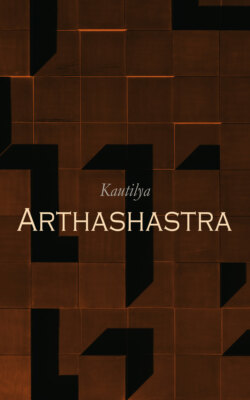Читать книгу Arthashastra - Kautilya - Страница 11
CHAPTER IX. THE CREATION OF COUNCILLORS AND PRIESTS.
ОглавлениеNATIVE, born of high family, influential, well trained in arts, possessed of foresight, wise, of strong memory, bold, eloquent, skillful, intelligent, possessed of enthusiasm, dignity, and endurance, pure in character, affable, firm in loyal devotion, endowed with excellent conduct, strength, health and bravery, free from procrastination and ficklemindedness, affectionate, and free from such qualities as excite hatred and enmity--these are the qualifications of a ministerial officer (amátyasampat).
Such as are possessed of one-half or one-quarter of the above qualifications come under middle and low ranks.
Of these qualifications, native birth and influential position shall be ascertained from reliable persons; educational qualifications (silpa) from professors of equal learning; theoretical and practical knowledge, foresight, retentive memory, and affability shall be tested from successful, application in works; eloquence, skillfulness and flashing intelligence from power shown in narrating stories (katháyogeshu, i.e., in conversation); endurance, enthusiasm, and bravery in troubles; purity of life, friendly disposition, and loyal devotion by frequent association; conduct, strength, health, dignity, and freedom from indolence and ficklemindedness shall be ascertained from their intimate friends; and affectionate and philanthrophic nature by personal experience.
The works of a king may be visible, invisible (paroksha) and inferential.
That which he sees is visible; and that which he is taught by another is invisible; and inference of the nature of what is not accomplished from what is accomplished is inferential..
As works do not happen to be simultaneous, are various in form, and pertain to distant and different localities, the king shall, in view of being abreast of time and place, depute his ministers to carry them out. Such is the work of ministers.
Him whose family and character are highly spoken of, who is well educated in the Vedás and the six Angas, is skillful in reading portents providential or accidental, is well versed in the science of government, and who is obedient and who can prevent calamities providential or human by performing such expiatory rites as are prescribed in the Atharvaveda, the king shall employ as high priest. As a student his teacher, a son his father, and a servant his master, the king shall follow him.
That Kshatriya breed which is brought up by Bráhmans, is charmed with the counsels of good councillors, and which faithfully follows the precepts of the sástras becomes invincible and attains success though unaided with weapons.
[Thus ends Chapter IX, “Creation of Councillors and Priests” in Book I “Concerning Discipline” of the Arthasástra of Kautilya.]
